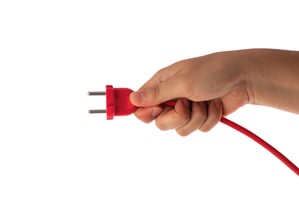You go to plug in your phone charger or an appliance and discover an outlet is not working. The...
Why Do the Lights Go Off When I Turn the Window AC On?
 Have you ever found that when you turn on a window air conditioner to cool a stuffy or too-hot room, your lights go off? The typical issue here is that the AC unit flipped a circuit breaker. Start with the Circuit Breaker
Have you ever found that when you turn on a window air conditioner to cool a stuffy or too-hot room, your lights go off? The typical issue here is that the AC unit flipped a circuit breaker. Start with the Circuit Breaker
Your home is wired to handle the various electrical loads as they are needed. When you have several electrical appliances plugged into the same circuit, the demand can outpace the electrical wiring capability. Because this can start a fire and destroy your home, the system is designed to shut off when demand is too high. Typically, the shut-off happens via a tripped circuit breaker.
A circuit breaker, or fuse, will restrict your power usage to what the wiring can handle safely. When the power need is too high, the circuit breaker flips, closing off the power supply. Your home electrical system will have two types of circuits. One is called a general-purpose circuit, and the other is a dedicated purpose circuit.
What is a Dedicated Circuit?
A general-purpose circuit will have several outlets on one circuit. Commonly, each circuit serves all of the outlets in that room. There will be one “circuit break” if any of the various outlets in that room are over-taxed. General-purpose breaker labels indicate the space they serve, like the master bedroom, living room, or kitchen.
Dedicated circuits serve heavy load items in the home, one per circuit, like a refrigerator, dishwasher, or hot tub. Because these items use a large amount of power - often associated with a heating or cooling element - keeping them on individual circuits works best and provides the safest conditions. Typically, the dedicated circuits in a home will have labels indicating the appliance or equipment they power.
What Circuit Does the AC Unit Use?
Where there is no central air-conditioning or circulation is inadequate, many people add a window unit to the room they want to cool, plug it in and wait for the chill to fill the area. The problem comes when that circuit is a general-purpose circuit, and other outlets on that circuit (like the lights) are in use. A window air-conditioner can consume anywhere from 500 to 1440 watts of power and should be plugged into a dedicated circuit. If it’s not, you will likely watch the lights go out every time you flip on the AC.
You may think it’s easy to grab an extension cord, but that can often trigger another safety problem. The extension cord may not be equipped for the voltage of your air conditioner and the cable stretching across the floor or into another room is a tripping hazard, especially for children or older adults.
If you make only occasional use of a window air-conditioning unit, things can be fine if you make sure the appliance is the only thing plugged into the general-purpose circuit. However, if you plan to leave your window AC running through a long, hot DC summer, it may be time to consider adding a dedicated circuit breaker.
Some may think this is an easy DIY job, but electrical loads throughout a house can vary widely, so it’s a good idea to leave it to the pros. Wilcox Electric has the experienced electricians you need.



